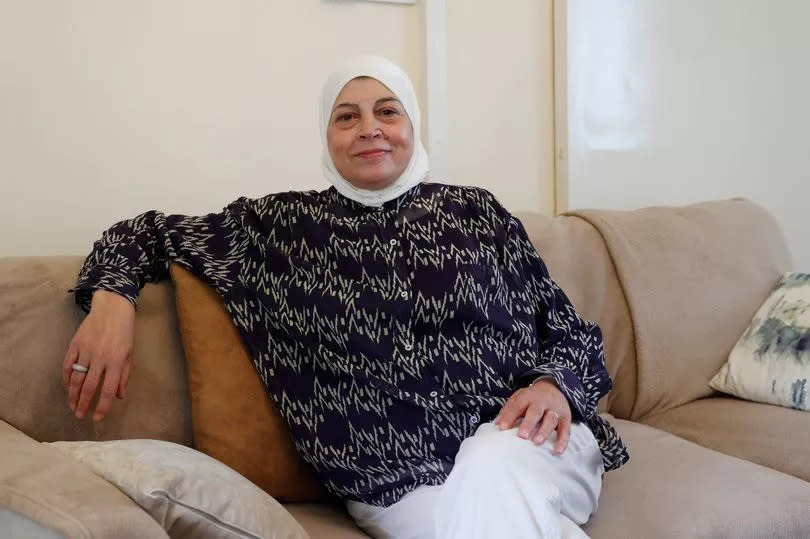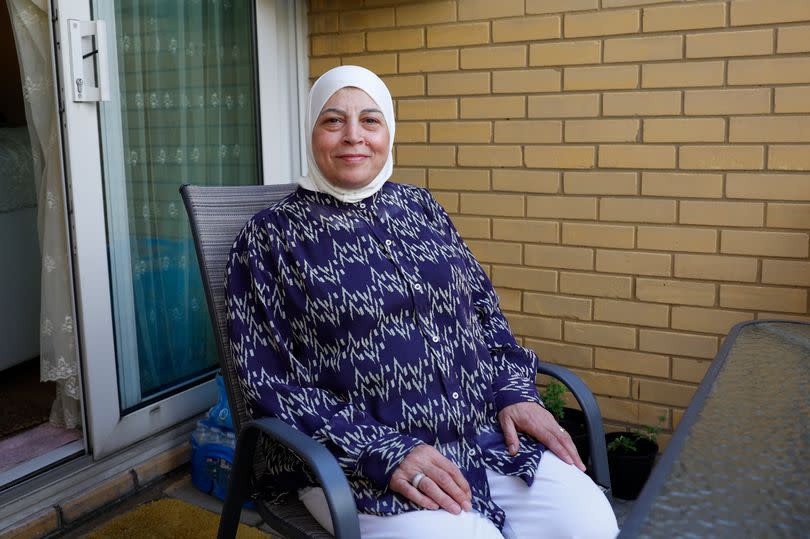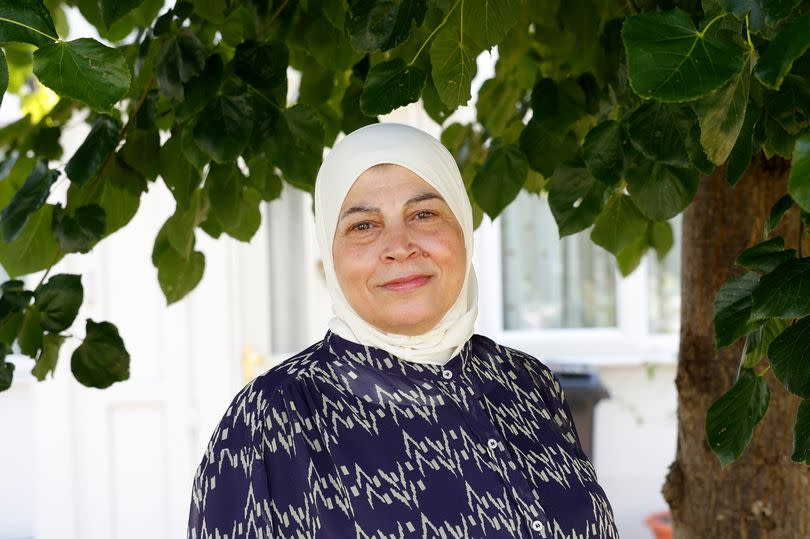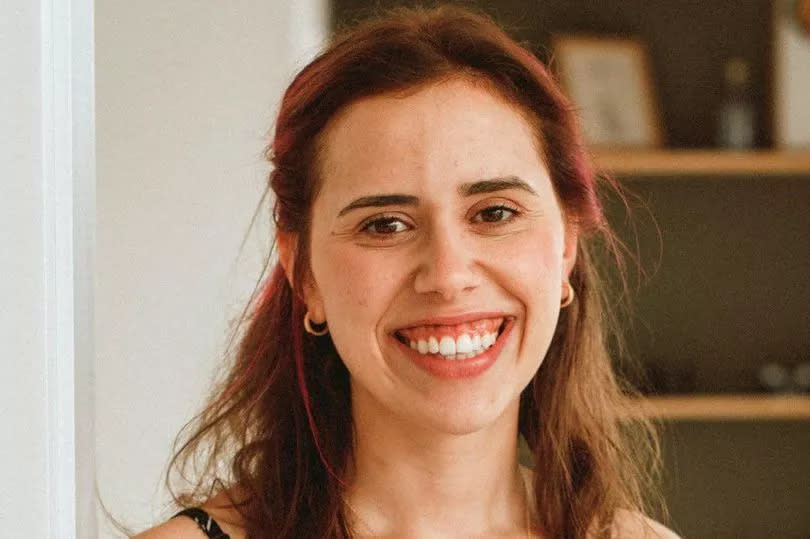'I've lived in UK long enough to see 4 prime ministers but I still can't vote for the next one'

A Syrian refugee has called on the government to give those with indefinite leave to remain to have a voice in politics. Current rules mean that only those with citizenship can vote in general elections meaning around five million UK residents are left without a say in how they are governed.
One of these people is Sanaa Haloul. In 2017, Sanaa, her husband, and one of her three sons fled the Middle East for the UK due to the Syrian Civil War through the Vulnerable Persons Resettlement Scheme.
Sanaa told MyLondon that initially she rejected her status as a refugee and refused to take up the scheme. However, as the situation became more perilous for her children she felt she must act. She said: "It was very dangerous for my sons to stay there, because they will take them to military service, and they will stay all their life in military service.

"Because we are against our president, they took my eldest son and imprisoned him for 18 days. Then when he was out I sent him to Lebanon and I sent my two twins to Jordan, then I followed them there."
Established towards the end of 2014 in response to civil war breaking out in the country in 2011 by the end of February 2021, 20,319 Syrian refugees had come to the UK through the scheme, according to the Refugee Council.
Despite this scheme, it was not always Sanaa's fate to come to the UK. She added: "All the interviews we made [were to go] to America, to the US. But when Donald Trump came to became President and said no immigration, and they called me, they said 'Please, we will send you to the UK. Would you accept?' and I said, "Of course, I like the UK more than the US'."
After escaping the conflict, Sanaa told MyLondon that as a beneficiary of the resettlement scheme she was "welcomed by the British government", an experience she knows is not the case for every asylum seeker. She added: "We are fortunate because we did not sit in a hotel for a long time. We met people who lived in a hotel for eight months, one year, two years. They are staying in the same place."
Soon after she arrived Sanaa and her family were moved to Hounslow, where she still lives, by council support staff. Sanaa said: "Then the next day, I was greeted by the Refugees Welcome Hounslow Committee. They came to visit me, and I felt relaxed. And they felt relaxed also because they knew that I could speak English."

Before fleeing her homeland Sanaa worked as an English teacher, educating her compatriots about the works of Shakespeare and Dickens. Her language ability was quickly put to good use after she was enrolled in an interpreting course and began helping the council and the Refugees Welcome Hounslow Committee communicate with Arabic speakers.
Sanaa proudly displays her interpretation certificate in her modest living - it symbolises her volunteer work and integration into Hounslow's refugee community where she has become a central figure. She has worked as part of outreach teams that go into, now infamous, asylum hotels, which due to its proximity to Heathrow, Hounslow has in large numbers.
It is clear, even simply by her prominence on the Refugees Welcome Hounslow website, that she plays an important role not just for refugees and asylum seekers but for Hounslow as a whole. Even with this outsized impact on the community and her support of local government for almost seven years, Sanaa is barred from voting.
Her son, who has worked at British institutions such as Selfridges, Harrods and now Heathrow and pays taxes was barred from voting. Despite the whole family having indefinite leave to remain and calling the UK their home, they are unable to have their say at the ballot box.
Sanaa said: "It's very important for people like me to be able to vote. I live here. I work here. My son works and pays taxes, so why don't we have the right? We have indefinite leave to remain. I was shocked when they told me I could not vote. I should have the right."
"I want to choose someone who is looking out for our community, for us as refugees, we want our safety, we want to be equal like others. Why not? We are British now. Here is our home.
"We will not vote for Rishi Sunak because he will want to send all refugees to Rwanda. These are human beings that come from dangerous places and they feel safe here, why would you want to send them to a dangerous place again?"
There are campaigners and even major political parties which are starting to push for this to change. Hounslow-based Lara Parizotto is the Co-Director of the Migrant Democracy Project, a campaign pushing for migrant representation in British politics including the expansion of voting rights.

"Our campaign is for every resident to have the right to vote. In Scotland and Wales, they have already extended the franchise to every resident, who has settled status, but only for their local and devolved elections," she told MyLondon.
"In a General Election, Commonwealth citizens have the right to vote, so some of Sanaa's friends at the Refugees Welcome Hounslow group do have the right to vote but Sanaa will not. So we want a level playing field where everyone has that right.
"People like Sanaa are living here, they have made this place their home. Sanaa is a clear example of someone who is not just passively living here but actively participating and when it comes to an issue, fighting for it. But when it comes to that key source of power, the vote, that's taken away, she is locked out of this key debate, this key election that is affecting her future."
Lara, who is a migrant herself and was a local councillor at one point, says her experiences have shaped her ideas on the issue. She added: "Migrants like us are talked about every day but never talked to. [We] are talked about negatively, policies are made against migrants not for migrants because our voices are not heard, are not needed, we don't have the leverage of the vote."
Lara took Sanaa to parliament to speak to politicians on all sides of the aisle about expanding the franchise with little success. Lara says that the unwillingness of the two major parties to endorse votes for migrants could be politically motivated.
Lara said: "We do hear from certain politicians that we don't want to extend the right to vote to certain groups because they are going to vote a certain way, that is a lot of assumptions. It is the job of politicians, the job of political parties is to convince people to vote for them.
"By not extending the franchise it keeps this whole group of people not even having their voices heard or even tested in that political area because of the assumption they will vote one way or another. There is an assumption that migrants will vote left."
It is not just a lack of political will that migrants are facing, but also a financial cost. While natural born citizens don't have to shell out thousands of pounds in order to prove their right to vote, migrants are forced to spend a fortune on applications.
'We paid £1,580 for our citizenship application but the price has now gone up'
Sanaa, who is currently waiting to hear the results of her citizenship application, said: "We paid £1,580 [for the citizenship application] but yesterday, my son told me that it is now £1,680. It keeps going up. Believe me, I cried when I heard about this money, I almost couldn't afford it. My son had to help me and my husband saved up a part of his pension.
"But when you hear some people say 'why don't they just become British?' they can't because the fee is too high."
However, there is some encouragement for those pushing for change. The Greens and Lib Dems have both promised to extend the franchise as part of their manifesto pledges.
The Liberal Democrat candidate for Feltham and Heston, Dhruv Sengupta has said: "It is vital that people whose future is going to be affected by a vote, are able to exercise their right to that vote. If you have the right to work at 16, why shouldn’t you also have the right to vote? If you have the right to stay permanently in this country, and have committed to that for 5 years, it is simply illogical that you aren’t already able to vote.
"It is the duty of governments to deliver power to the people, and ensure that *all* people who can vote, especially the underrepresented, are empowered, through an automatic system of inclusion in elections."
For Sanaa, the right to vote is about safety and representation. If an anti-immigrant party was to gain power and threaten her or her children's status in the UK it could be a matter of life or death. She said if she was ever forced to return to Syria: "My sons are still in danger. This is a matter of our lives, of our future."
Don't miss out on the biggest local stories. Sign up to our MyWestLondon newsletter HERE for all the latest daily news and more.

 Yahoo News
Yahoo News 
